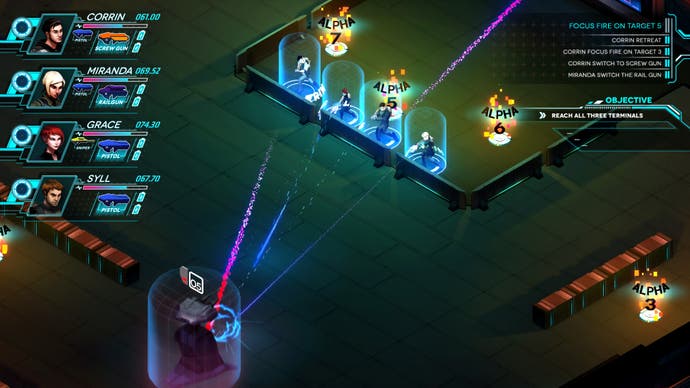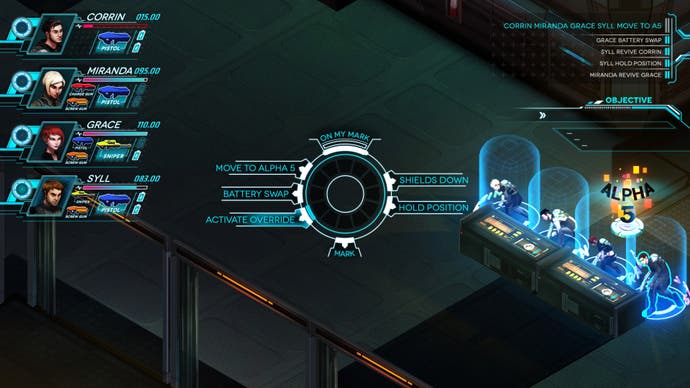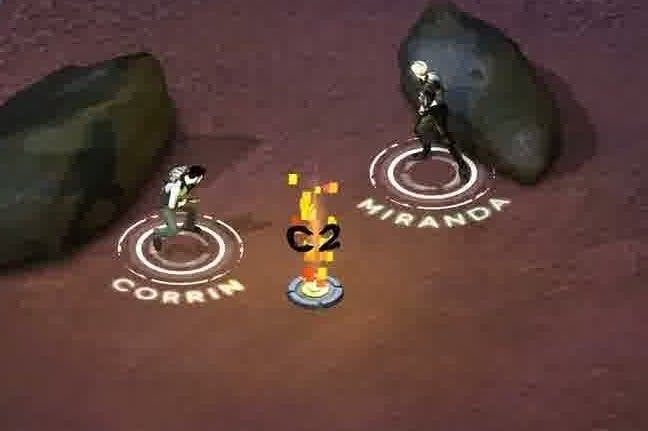There Came an Echo review
Speak your brains.
Vocal interaction with video games is nothing new. We've all let fly with a string of choice expletives thanks to a poorly placed checkpoint or a cheap shot that leads to an unfair Game Over screen. More rare are the games that actually listen to what you say, and respond in kind.
From Sega's super-creepy Seaman to PS3 obscurity Lifeline, and on through the trials and tribulations of Tom Clancy's EndWar and too many Xbox games with inorganic Kinect features, the idea of talking to the screen and seeing your commands acted out remains a powerful - if elusive - dream. Indie strategy game There Came an Echo comes closer than most, but can't quite sell the technology in the long term.
It's a cyberpunky sort of tale, which opens with a guy called Corrin working in a trendy Californian tech company. He's invented an open source encryption system called Radial Lock, so advanced that nobody can actually use it until the quantum computers needed to run the code have been invented. Of course, it turns out they have been invented, and dodgy people want Corrin for their own nefarious ends.
The twist is that you don't play as Corrin. You play as Sam, the person who is going to guide Corrin - and eventually the other characters caught up in his plight - as they try to get to the bottom of the conspiracy. And you do this by talking to them. Actually talking to them. With your real mouth.
With headset and microphone in place, and after some calibration, your first task is to guide Corrin out of his office before evil black-suited agents catch him. If you missed The Matrix reference, don't worry - the game spells it out, both in dialogue and in the form of your first Achievement.

As you work through the first tutorial-esque stages, you're soon able to tell the characters what to do in a variety of combat situations, stealthy intrusions and all-out assaults. First you say the name of the character, then what you want them to do. "Corrin, switch to pistol", for example. "Miranda, focus fire on Enemy 1" would be another. "Grace, move to Alpha 3" yet another.
It works by assigning these alphanumeric designations to everything you can interact with. Cover spots are marked using the Alpha Bravo Charlie phonetic alphabet, enemies with numbers and so on. It's simple and, for the most part, effective.
It's certainly a thrill to give a verbal order and see it followed on-screen. Yes, a lot of the time you could just as easily tap a button or click a mouse, but when the system works it's so natural and seamless that you genuinely feel like a character in the story - the unseen member of the team, watching over them.
That's when it works which, to be fair, is most of the time. Sometimes it doesn't though, and those moments leave you feeling as impotent and frustrated as any early motion control title. The game is generous with options to enable you to maximise the voice recognition - particularly if you have a strong accent - but I found that even playing in a completely quiet room with no background noise, it could go from being absolutely perfect to ignoring my every word for no apparent reason. Val, your support character, will chip in when you're speaking too quietly or too loudly, but it's hard not to feel that such stumbles break the hard-earned immersion.
Arguably more problematic are the restrictions the voice control places on the actual game design. You can only ever move to places that the game has designated with a marker, for example, so your tactics can often feel uncomfortably restricted. Similarly, the fact that the game is real-time rather than turn-based means that things can get hectic quite easily, and the system isn't always great at responding under pressure.

Every character has a shield they automatically deploy, but using special weapon modes - such as the grenade-style Charge Gun or the Sniper Rifle - eat into that energy just as much as enemy fire. When so much of the game's cover is deliberately low and ineffective, you'll find yourself in situations where you can't help but lose energy. Since the speech software responds best to calm, measured commands, it feels like it is sorely lacking map design where you get the chance to take stock, make plans and execute them. As it is, the same frantic flanking manoeuvres are what you'll fall back on for most encounters.
What ties it all together is the story, which is genuinely fun and well written. The dialogue has a tendency to drift into Joss Whedon style cute whimsy, and the Tumblr-friendly cast includes obligatory internet celeb Wil Wheaton and video game voice veterans Ashly Burch and Yuri Lowenthal. It can get a little too snarky and precious, but there's no denying that it's done well and stands head and shoulders above most indie game scripts. The soundtrack is quite special too; a genuinely stirring suite of music that wouldn't be out of place in a film or TV show.
The visuals don't quite match up to the standard set by the audio. The character models are stylised, but the animation can be jerky and unconvincing. The need to keep the camera zoomed out during combat means that you only get to see them up close during the many cutscenes. Oh so many cutscenes. This is a game that is so much in love with its story and script that it often leaves the player twiddling their thumbs for too long. For a game in which the player's speech is so central, there are too many stretches where all you're asked to do is sit back and shut up.
It's not a long game by any stretch, with the story running four or five hours at the most. It's one hell of a ride during that time, however, with a climax that is far stranger and more memorable than most games manage. You'll definitely want to play to the end. After that, there's just the War Room but this is less of a bonus survival game and more of a practice arena where you can try out your own voice commands and hone your multitasking skills.
On balance, there's more to admire in There Came an Echo than there is to complain about. It has its flaws, but those are put into perspective by the mostly impressive speech technology, the exuberant storytelling and the simple fact that there really isn't anything else quite like it. Developer Iridium Studios is certainly serious about improving and tightening the experience, as the game's lively Steam forums prove, so it wouldn't be a surprise if a lot of the problems with the game are addressed sooner or later.
For now it's a game with a lot to offer, though mostly for players willing to meet its ambitions halfway. I can't help feeling that we'll see this speech mechanic refined and put to even better use somewhere down the line.

